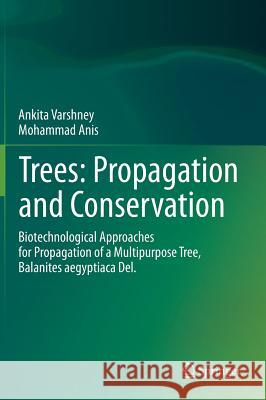Trees: Propagation and Conservation: Biotechnological Approaches for Propagation of a Multipurpose Tree, Balanites Aegyptiaca Del. » książka
Trees: Propagation and Conservation: Biotechnological Approaches for Propagation of a Multipurpose Tree, Balanites Aegyptiaca Del.
ISBN-13: 9788132217008 / Angielski / Twarda / 2014 / 116 str.
Trees: Propagation and Conservation: Biotechnological Approaches for Propagation of a Multipurpose Tree, Balanites Aegyptiaca Del.
ISBN-13: 9788132217008 / Angielski / Twarda / 2014 / 116 str.
(netto: 575,06 VAT: 5%)
Najniższa cena z 30 dni: 578,30
ok. 16-18 dni roboczych.
Darmowa dostawa!
Plant tissue culture is an essential component of Biotechnology which has gained unbeatable recognition in plant sciences for successful micropropagation and improvement of plant species, leading to the commercial application. A number of plant species have been investigated around the globe. This book presents current research on the application of in vitro technology in the improvement of Balanites aegyptiaca Del., a medicinal plant of semi-arid tropics. The worldwide importance of forestry, summed to the lengthy generation cycles of tree species, makes unavoidable development of new technologies that complement conventional tree breeding programmes in order to obtain improved genotypes. Recently, a new set of tools has become available in the past 20 years that combined with traditional plant breeding will allow scientists to generate products that are genetically improved varieties of the future. These set of tools come under the general title of 'Biotechnology'. The three specific biotechnological tools have been successfully used in several programmes of plant conservation, namely, tissue culture techniques for in vitro propagation, the use of molecular markers to assess the degree of variability among population and techniques of long-term conservation such as encapsulation and cryopreservation. Plant tissue culture techniques are particularly relevant and become an alternative not only for large scale propagation of individuals that are threatened, reduce production costs and increase gains to the industry, but also to provide ecological advantages as in phytoremediation or in the establishment of artificial plantings in weed infested site. The book gives a complete documentation of the results and demonstration of Balanites aegyptiaca conducted by the authors over the past 5 years. The end-to-end approach developed through plant tissue culture techniques is reflected in the book and there has been a successful transfer of technology from lab to field. The authors hope that this information would provide valuable data and also be a reference material for future research activities in this area.











